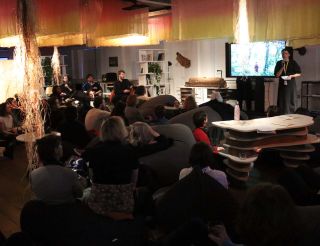Environment
Evicted From Their Forest Home
Batwa in Uganda experience mental health impacts from forced evictions.
Posted May 14, 2024 Reviewed by Michelle Quirk
Key points
- In Uganda, Batwa previously lived nomadically in the forest, helping to conserve it.
- In the 1990s, Batwa were forcibly evicted for conservation, leading to severe mental health impacts.
- A new podcast tells the Batwa story in their own words with their music.
Eviction, displacement, forced migration, expulsion, ejection, and removal: These words inadequately describe the experience of being thrown out of one’s home and off one’s land at gunpoint. It happened to the Batwa people of Kanungu district in southwestern Uganda.
Batwa podcast

A new podcast listens to Batwa community members located in Buhoma, on the outskirts of Bwindi Impenetrable National Park, to understand their own words of the horrors imposed on them and their struggle to keep their culture and memories alive. Called Born From Here / Nkanzarirwa Hanu, the podcast foregrounds narratives of hopes and fears of the past, present, and future against the background of evocative sounds from bees, leaves, and birds.
Land Body Ecologies podcast is produced by U.K. arts studio, Invisible Flock, and this episode, Born From Here / Nkanzarirwa Hanu, is also produced with Action for Batwa Empowerment Group (ABEG), as part of a two-year residency at the Wellcome Hub in central London, U.K. for the project Land Body Ecologies. The project is a collective with artists, scientists, and expert communities (including land-dependent and Indigenous communities), researchers, designers, conservationists, technologists, and activists across three continents.
I am a team member as a scientist, learning and contributing on how our colleagues and friends around the world have been forced to deal with environmental changes and the subsequent mental and emotional health consequences. We hope to support these communities in documenting their stories of solastalgia—psychological distress from experiencing environmental changes to one’s home—and the actions they use to overcome the challenges imposed on them.
Contemporary human-caused climate change is one component. It goes far beyond. Logging, mining, and damming rivers have undermined local knowledge, ruined local resources, and undercut the livelihoods and emotional well-being of locals. Generations of connections with their lands and nature have been severed.
Land is life
For the Batwa community, their land is their life. They lived off the forest and so the forest thrived off them. The oldest Batwa alive today were hunters-gatherers, enjoying honey, yams, other roots, meat from animals, and mudfish—all that they could find and harvest around them. They would sit around campfires in the evenings, teaching their children how to live with the environment.
They were nomads. Never overusing local resources, when an area required replenishing, they would move elsewhere.
Then, a few decades ago, others moved into the forest, felled trees, and built houses for farming. With the land being ruined, the government moved in, using weapons to push Batwa out, to places where Batwa community members did not know how to fend for themselves.
When Batwa tried to return, the government rangers violently denied them entry. The Batwa community had been “resettled” in the name of environmental conservation and species protection, to create a national park.
Led by Sylvia Kokunda, the founder and CEO of the Action for Batwa Empowerment Group (ABEG), the Batwa community explains how they had conserved rather than exploited their forest home. They avoided harming the gorillas, seeing them as cousins and avoiding setting traps along gorilla tracks. Batwa used the treasure trove of local plants for their medicinal properties, treating conditions from malaria to period pain.
Now, many seek casual labour in order to feed themselves each day. Others are employed as park rangers and tourist guides, sustaining a modicum of their knowledge.
A modicum, because Batwa face discrimination, commodification and fetishization of their culture, assault and rape by non-Batwa, suppression of their language and belief systems, disease to which they were not previously exposed, lack of political representation, arbitrary imprisonment, hunger, lack of fresh water, and inadequate sanitation. The negative mental health impacts, the solastalgia, comes through the podcast poignantly and emotively as each individual relates their story about the little that they have alongside their immeasurable losses. And then they describe poor health care access, for both physical and psychological ailments.
Three versions of the podcast have been released online. The first is the 60 minutes of the full script, interlaced with Batwa music and singing as well as nature’s sounds recorded locally. Track B is the sounds only without the spoken word. The podcast is also available in the Batwa language, Rutwa, helping to capture their presence in their own ways in their own words.
Nothing can make up for the lost past. Batwa are no longer living in the forest, but merely remembering it. The eternal hope is for a better land-based future.
References
Ahmad, A., V. Pratt, and S. Gougsa. 2022. “Where is the land and indigenous knowledge in understanding land trauma and land based violence in climate change?” BMJ, vol. 379, article o2790.
Gougsa, S., V. Pratt, B. George, C. Vilela, D. Kobei, S. Kokunda, I. Kelman, B. Eaton, L. Maina, S. Luari, O. Autti, K. Kerätär, J. Laiti, C. Baxendale, R. Raj, R. Deshpande, R. Gokharu, N. Singh, S. Ghelani, N. Mendu, A. Ahmad, and Land Body Ecologies research group. 2023. Land Body Ecologies: A case study for global transdisciplinary collaboration at the intersections of environment and mental health. The Journal of Climate Change and Health, vol. 10, article 100206.
Kelman, I., V. Pratt, A. Ahmad, A. Balderston, C. Baxendale, B. Eaton, S. Ghelani, S. Gougsa, H.-N. Huang, N. Mendu, and C. Vilela. 2023. "Land Body Ecologies: The London hub". Journal of Design for Resilience in Architecture and Planning, vol. 4, pp. 1–24.
Kokunda, S., H. Nahabwe, J. Nahamya, S. Niwamanya, R. Mazirwe, S. Gougsa, E. Kemigisha, and N. Redvers. 2023. “Batwa Indigenous Peoples forced eviction for “Conservation”: A qualitative examination on community impacts.” PLOS Global Public, Health vol. 3, no. 8, article e0002129.




